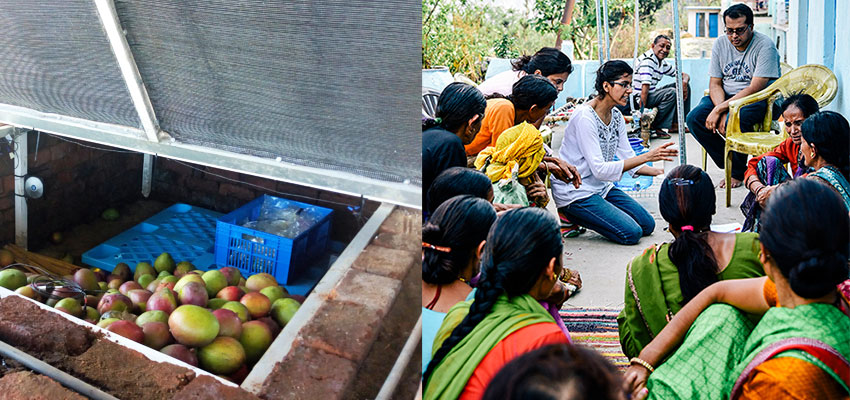
Announcement as posted by J-WAFS
Abdul Latif Jameel Water and Food Systems Lab
We are pleased to announce the 2019 winners of the J-WAFS Grant for Water and Food Projects in India, which funds implementation projects by current members of the MIT community that develop solutions to current water or food challenges in India. This grant specifically supports more advanced MIT research projects that can benefit from on-the-ground opportunities to pilot the work. A wide variety of proposals was submitted for the grant, representing the creative and solutions-oriented approach MIT researchers apply to food and water challenges. An interdisciplinary faculty team conducted a rigorous review, and selected two winning projects. Each team will receive $15,000, which will support work through 2020.
2019 grant award winners:
Piloting Evaporative Cooling Technologies to Improve Vegetable Shelf-life and Farmer Income in Western India
Project team: Eric Verploegen, Research Engineer, MIT D-Lab and Anish Paul Antony, Postdoctoral Researcher, MIT D-Lab
In India, 30% of the fruits and vegetables cultivated annually are lost due to insufficient post-harvest storage options. According to the Associated Chambers of Commerce and Industry of India, the annual post-harvest fruit and vegetable losses in Gujarat alone have accounted for $1,805 million. The lack of affordable and effective post-harvest vegetable cooling and storage poses a significant challenge for smallholder farmers that can lead to vegetable spoilage, reduced income, and lost time. This grant is supporting a research team to pilot a design for a novel, brick-based Evaporative Cooling Chamber (EEC), which is intended to limit the deterioration of fruit and vegetable harvest quality due to post-harvest wilting and ripening and, elongate shelf-life. Improving the shelf-life of post-harvest products using this device will enable farmers to receive significantly higher prices in local and wholesale markets by selling produce that has retained its freshness and nutritional quality.
Development of Communication Materials for the Dissemination and Commercialization of an open-sourced Xylem Water Filter
Project team: Rohit Karnik, Associate Professor, Department of Mechanical Engineering; Krithika Ramchander, PhD candidate, Department of Mechanical Engineering; Amy Smith, Founding Director, MIT D-Lab; Kendra Leith, Associate Director for Research, MIT D-Lab; Megha Hegde, Research Associate, MIT D-Lab; Anish Paul Antony, Postdoc, MIT D-Lab
Microbial contamination of drinking water is a major cause of health concerns for communities without access to sources of clean water. In India in particular, diarrhea caused by microbial contamination of drinking water is the third leading cause of childhood mortality. The use of household water treatment methods can improve water quality and decrease the instances of illness due to contamination. However, the adoption of these methods in low-resource settings continues to be poor due to limited access to existing technologies as well as their affordability. A lack of awareness of the negative health effects of contaminated water is also a significant barrier. This funded project seeks to address the challenge of technology access as well as awareness. This MIT team has produced a water purifier that uses the natural filtration capabilities of xylem tissue in wood. While this open-sourced technology is ready for deployment through on-the-ground connections with local partners, the challenge of awareness and technology adoption continue. To meet this challenge, the grant will fund the research team to prepare a suite of communications materials to accompany the filter, as well as to develop an outreach strategy that will support the commercialization of the technology in India. In collaboration with local NGOs, the team will create a website to guide entrepreneurs interested in marketing the technology, develop support and explanatory materials for the device, and develop specific education materials for high school student to learn about the filter technology.
The J-WAFS Grant for Water and Food Projects in India was made possible by a generous donation from MIT alumnus Kishore Mariwala SM '59.

